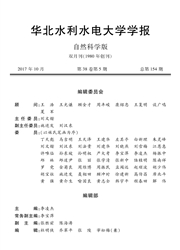

 中文摘要:
中文摘要:
在全球气候变化和高强度的人类活动影响下,许多流域和地区的天然水文序列的一致性遭到破坏。对于洞庭湖流域,其洪水要素序列发生了明显变异,使得基于一致性的洪水频率计算方法不再满足实际需求,也无法作为防洪安全评价的主要依据。研究适用于变化环境的非一致性洪水的防洪安全评价方法变得尤为重要。围绕变化环境下的水文变异问题,首先梳理总结了相关研究成果和主要方法,然后综述了非一致性洪水频率计算的研究进展和区域水安全评价的基本方法,并重点对目前研究中存在的不足进行了说明。在此基础上,围绕如何探索变化环境下洞庭湖洪水规律识别和科学防洪安全评价问题,指出了未来研究需要重点关注和解决的科学问题。
 英文摘要:
英文摘要:
Under the great influence of both global climate change and intensive human activities, the consistency of hydrological processes in many basins and regions is damaged. For the Dongting Lake basin which is also greatly impacted by environmental change, the data series of key flood factors show obvious variability and do not meet their consistency condition. Under the adverse situ- ation, the consistency-based hydrological frequency analysis approach can not meet the practical needs enough, and it can not be the basis of security evaluation and flood control, either. Therefore, the development of more effective approach which can adapt the envi- ronmental change impacts becomes a very important issue. In the article, we first summarized the relevant studies on the hydrological variability under environment change conditions; then, we discussed the research progress and main methods for the inconsistency- based hydrological frequency analysis and the security evaluation of regional flood, and further explained the main defects and lacks in current studies. Finally, around how to probe the problems of the security evaluation of scientific flood control and the recognition of flood laws of Dongting Lake under changing environment conditions, we pointed out some important science problems which should be focused on and resolved.
 同期刊论文项目
同期刊论文项目
 同项目期刊论文
同项目期刊论文
 期刊信息
期刊信息
